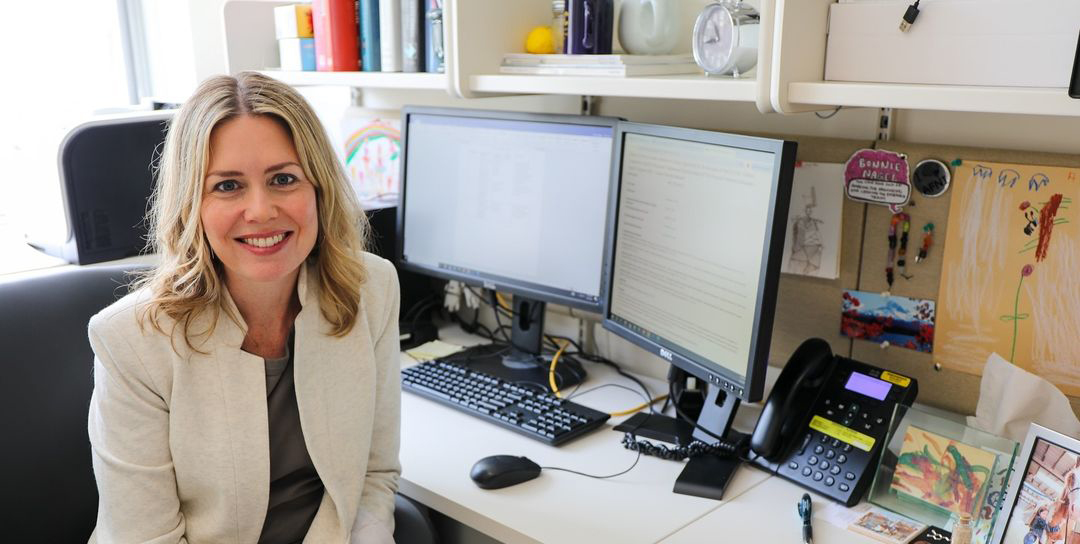Championing youth mental health through research
By Darby Kendall
Mental health challenges for today’s youth are growing at a startling rate, and experts are searching for solutions.
Bonnie Nagel, Ph.D., director of the OHSU Center for Mental Health Innovation, is deeply committed to understanding the causes of these struggles and improving the well-being of young people. Through groundbreaking research spanning over 15 years, her team has investigated key issues like depression, self-harm and addiction, aiming to transform care for future generations.
This is an audio story featuring highlights from a conference Nagel spoke at in the spring of 2024.
Transcript
The most common question that I get asked as a psychologist and somebody who studies child and adolescent mental health is, “What is going on? Why is there such a problem with mental health in today’s youth?” And I have given that question a lot of thought.
Dr. Bonnie Nagel, director of the OHSU Center for Mental Health Innovation, is passionate about investigating and improving youth well-being. Her lab has been conducting studies of Portland-area youth for the past 15 years with the goal of lowering rates of depression, self-harm and addiction in younger generations. Here are key highlights from a conference she spoke at in March 2024.
We know that there is a crisis. It is all around us. In fact, the Surgeon General declared a national state of emergency for child and adolescent mental health, just as suicide was rising to the second leading cause of death in our youth. So I’ve given this a lot of thought, but I don’t need the Surgeon General to tell me that we have a crisis. At OHSU, we lead one of the largest studies of child and adolescent mental health in the nation. This study has studied 9- and 10-year-old kids for eight years, almost 12,000 of them across 21 data collection sites. At OHSU, we are responsible for following about 550 of these kids. As a part of that study, we ask questions about child and adolescent mental health; we ask questions about mood; we ask questions about suicide, and as the leader of that study for OHSU, I get a text every time a child says they have thoughts of harming themselves. I get texted upward toward five times a week, and I have since these kids were 9 and 10 years of age. I don’t need the Surgeon General to tell me we have a crisis. As a psychologist, as a scientist, as a parent of three teenagers, it keeps me up at night.
We need more scientific discovery. We need to understand mechanisms of mental health problems so that we can develop new targeted treatments. The other thing that we need to do is use scientific knowledge that we already have and bring it into the care that we’re delivering. Now, what else are we doing in the center? So we have 10 world-renowned scientists that are studying all facets of child and adolescent mental health: anxiety, depression, bipolar disorder, addiction, suicide. And they’re studying it developmentally from conception, so in pregnant mothers all the way through young adulthood. There have been some fantastic discoveries that have been made. So understanding, to my point earlier, we have been working to identify algorithms that can tell us, does this child have ADHD? What’s the likelihood of it for this child? Does this child who’s presenting with a bit of a mood disturbance have a likelihood of increasing in severity or experiencing suicidality even years down in the future? The breadth and depth of our scientific investigators has, in fact, allowed us to be successful in some of the most significant federal opportunities to study mental health in the nation. OHSU is unique in this regard.
I am an extremely optimistic human, and we are on the precipice. What I described to you today is a real need. We have got to move the science forward. We’ve got to use it in care, and if we do that, it will make a difference. It will. I always make the joke, I’m a little grandiose, like I’ve got a vision. But is it really that grandiose to think that we’d use technology to improve our efficacy and efficiency? Is that really that far fetched? I don’t think it is. I don’t think it is. And so the optimism is that we’re on the precipice. These studies are being done for the first time ever. So the optimism is that if we keep trying, if we keep working, it will make a difference.
Imagine that every child could get the best access to the best care that they need. Just imagine that for a minute. Imagine that we could intervene early and heal kids early, reducing incidence of mental health problems. Imagine that providers could spend quality time, not collecting data on their patients, but meaningfully intervening. And imagine that their expertise is then captured in our scientific discovery to make the whole system better. We can do this. This is what we need, and with additional support, we will make a difference. It will get better.

